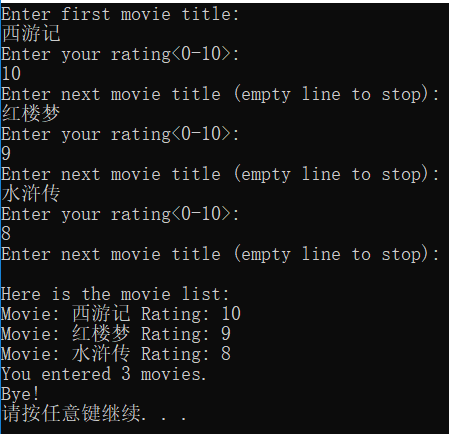抽象数据类型(ADT)——链表
作者:追风剑情 发布于:2020-4-21 11:23 分类:C
示例:通过链表储存用户输入的影片信息
list.h
//#pragma once
//防止多次包含头文件
#ifndef LIST_H_
#define LIST_H_
#include <stdbool.h> /* C99特性 */
/* 特定程序的声明 */
#define TSIZE 45 /* 储存电影名的数组大小 */
struct film
{
char title[TSIZE];
int rating;
};
/* 一般类型定义 */
typedef struct film Item;
typedef struct node
{
Item item;
struct node * next;
} Node;
typedef Node * List;
/* List的另一种定义 */
/*
typedef struct list
{
Node * head; //指向链表头的指针
Node * end; //指向链表尾的指针
int size; //链表中的项数
} List;
*/
/* 函数原型 */
/* 操作: 初始化一个链表 */
/* 前提条件: plist指向一个链表 */
/* 后置条件: 链表初始化为空 */
void InitializeList(List * plist);
/* 操作: 确定链表是否为空,plist指向一个已初始化的链表 */
/* 后置条件: 如果链表为空,该函数返回true;否则返回false */
bool ListIsEmpty(const List * plist);
/* 操作: 确定链表是否已满,plist指向一个已初始化的链表 */
/* 后置条件: 如果链表已满,该函数返回true;否则返回false */
bool ListIsFull(const List * plist);
/* 操作: 确定链表中的项数,plist指向一个已初始化的链表 */
/* 后置条件: 该函数返回链表中的基数 */
unsigned int ListItemCount(const List * plist);
/* 操作: 在链表的末尾添加项 */
/* 前提条件: item是一个待添加至链表的项,plist指向一个已初始化的链表 */
/* 后置条件: 如果可以,该函数在链表末尾添加一个项,且返回true,否则返回false */
bool AddItem(Item item, List * plist);
/* 操作: 把函数作用于链表中的每一项 */
/* plist指向一个已初始化的链表 */
/* pfun指向一个函数,该函数接受一个Item类型的参数,且无返回值 */
/* 后置条件: pfun指向的函数作用于链表中的每一项一次 */
void Traverse(const List * plist, void(*pfun)(Item item));
/* 操作: 释放已分配的内存(如果有的话) */
/* plist指向一个已初始化的链表 */
void EmptyTheList(List * plist);
#endif
list.c
#include <stdio.h>
#include <stdlib.h>
#include "list.h"
/* 局部函数原型 */
static void CopyToNode(Item item, Node * pnode);
void InitializeList(List * plist)
{
*plist = NULL;
}
/* 如果链表为空,返回true */
bool ListIsEmpty(const List * plist)
{
if (*plist == NULL)
return true;
return false;
}
/* 如果链表已满, 返回true */
bool ListIsFull(const List * plist)
{
Node * pt;
bool full;
pt = (Node *)malloc(sizeof(Node));
if (pt == NULL) //分配内存失败
full = true;
else
full = false;
free(pt);
return full;
}
/* 返回节点的数量 */
unsigned int ListItemCount(const List * plist)
{
unsigned int count = 0;
Node * pnode = *plist; /* 设置链表的开始 */
while (pnode != NULL)
{
++count;
pnode = pnode->next; /* 设置下一个节点 */
}
return count;
}
/* 创建储存项的节点,并将其添加至由plist指向的链表末尾(较慢的实现) */
bool AddItem(Item item, List * plist)
{
Node * pnew;
Node * scan = *plist;
pnew = (Node *)malloc(sizeof(Node));
if (pnew == NULL) //分配内存失败
return false;
CopyToNode(item, pnew);
pnew->next = NULL;
if (scan == NULL) //如果链表为空
*plist = pnew;
else
{
while (scan->next != NULL)
scan = scan->next; //找到链表的末尾
scan->next = pnew; //把pnew添加到链表的末尾
}
return true;
}
/* 访问每个节点并执行pfun指向的函数 */
void Traverse(const List * plist, void(*pfun)(Item item))
{
Node * pnode = *plist; /* 设置链表的开始 */
while (pnode != NULL)
{
(*pfun)(pnode->item); /* 把函数应用于链表中的项 */
pnode = pnode->next;
}
}
/* 释放由malloc()分配的内存 */
/* 释放链表指针为NULL */
void EmptyTheList(List * plist)
{
Node * psave;
while (*plist != NULL)
{
psave = (*plist)->next;
free(*plist);
*plist = psave;
}
}
/* 局部函数 */
/* 把一个项拷贝到节点中 */
static void CopyToNode(Item item, Node * pnode)
{
pnode->item = item;
}
Main.c
#define _CRT_SECURE_NO_WARNINGS
//可以用#ifndef指令,防止多次包含一个文件
#include <stdio.h>
//提供malloc()原型
#include <stdlib.h>
//提供strcpy()原型
#include <string.h>
//提供CHAR_BIT的定义,CHAR_BIT表示每字节的位数
#include <limits.h>
//C99定义了bool、true、false
//如果编译器不支持bool,可以用枚举替代enum bool {false, true};
#include <stdbool.h>
#include "list.h"
void showmovies(Item item);
char* s_gets(char* st, int n);
int main(int argc, char* argv[])
{
List movies;
Item temp;
/* 初始化 */
InitializeList(&movies);
if (ListIsFull(&movies))
{
fprintf(stderr, "No memory available! Bye!\n");
exit(1);
}
/* 获取用户输入并储存 */
puts("Enter first movie title:");
while (s_gets(temp.title, TSIZE) != NULL &&
temp.title[0] != '\0')
{
puts("Enter your rating<0-10>:");
scanf("%d", &temp.rating);
while (getchar() != '\n')
continue;
if (AddItem(temp, &movies) == false)
{
fprintf(stderr, "Problem allocating memory\n");
break;
}
if (ListIsFull(&movies))
{
puts("The list is now full.");
break;
}
puts("Enter next movie title (empty line to stop):");
}
/* 显示 */
if (ListIsEmpty(&movies))
printf("No data entered.");
else
{
printf("Here is the movie list:\n");
Traverse(&movies, showmovies);
}
printf("You entered %d movies.\n", ListItemCount(&movies));
/* 清理 */
EmptyTheList(&movies);
printf("Bye!\n");
system("pause");
return 0;
}
void showmovies(Item item)
{
printf("Movie: %s Rating: %d\n", item.title, item.rating);
}
// 自己实现读取函数
char* s_gets(char* st, int n)
{
char* ret_val;
int i = 0;
ret_val = fgets(st, n, stdin);
if (ret_val) //即,ret_val != NULL
{
while (st[i] != '\n' && st[i] != '\0')
i++;
if (st[i] == '\n')
st[i] = '\0';
else
while (getchar() != '\n')
continue;
}
return ret_val;
}
标签: C语言
« 抽象数据类型(ADT)——队列
|
NGUI分割图集»
日历
最新文章
随机文章
热门文章
分类
存档
- 2026年1月(5)
- 2025年12月(1)
- 2025年11月(1)
- 2025年9月(3)
- 2025年7月(4)
- 2025年6月(5)
- 2025年5月(1)
- 2025年4月(5)
- 2025年3月(4)
- 2025年2月(3)
- 2025年1月(1)
- 2024年12月(5)
- 2024年11月(5)
- 2024年10月(5)
- 2024年9月(3)
- 2024年8月(3)
- 2024年7月(11)
- 2024年6月(3)
- 2024年5月(9)
- 2024年4月(10)
- 2024年3月(11)
- 2024年2月(24)
- 2024年1月(12)
- 2023年12月(3)
- 2023年11月(9)
- 2023年10月(7)
- 2023年9月(2)
- 2023年8月(7)
- 2023年7月(9)
- 2023年6月(6)
- 2023年5月(7)
- 2023年4月(11)
- 2023年3月(6)
- 2023年2月(11)
- 2023年1月(8)
- 2022年12月(2)
- 2022年11月(4)
- 2022年10月(10)
- 2022年9月(2)
- 2022年8月(13)
- 2022年7月(7)
- 2022年6月(11)
- 2022年5月(18)
- 2022年4月(29)
- 2022年3月(5)
- 2022年2月(6)
- 2022年1月(8)
- 2021年12月(5)
- 2021年11月(3)
- 2021年10月(4)
- 2021年9月(9)
- 2021年8月(14)
- 2021年7月(8)
- 2021年6月(5)
- 2021年5月(2)
- 2021年4月(3)
- 2021年3月(7)
- 2021年2月(2)
- 2021年1月(8)
- 2020年12月(7)
- 2020年11月(2)
- 2020年10月(6)
- 2020年9月(9)
- 2020年8月(10)
- 2020年7月(9)
- 2020年6月(18)
- 2020年5月(4)
- 2020年4月(25)
- 2020年3月(38)
- 2020年1月(21)
- 2019年12月(13)
- 2019年11月(29)
- 2019年10月(44)
- 2019年9月(17)
- 2019年8月(18)
- 2019年7月(25)
- 2019年6月(25)
- 2019年5月(17)
- 2019年4月(10)
- 2019年3月(36)
- 2019年2月(35)
- 2019年1月(28)
- 2018年12月(30)
- 2018年11月(22)
- 2018年10月(4)
- 2018年9月(7)
- 2018年8月(13)
- 2018年7月(13)
- 2018年6月(6)
- 2018年5月(5)
- 2018年4月(13)
- 2018年3月(5)
- 2018年2月(3)
- 2018年1月(8)
- 2017年12月(35)
- 2017年11月(17)
- 2017年10月(16)
- 2017年9月(17)
- 2017年8月(20)
- 2017年7月(34)
- 2017年6月(17)
- 2017年5月(15)
- 2017年4月(32)
- 2017年3月(8)
- 2017年2月(2)
- 2017年1月(5)
- 2016年12月(14)
- 2016年11月(26)
- 2016年10月(12)
- 2016年9月(25)
- 2016年8月(32)
- 2016年7月(14)
- 2016年6月(21)
- 2016年5月(17)
- 2016年4月(13)
- 2016年3月(8)
- 2016年2月(8)
- 2016年1月(18)
- 2015年12月(13)
- 2015年11月(15)
- 2015年10月(12)
- 2015年9月(18)
- 2015年8月(21)
- 2015年7月(35)
- 2015年6月(13)
- 2015年5月(9)
- 2015年4月(4)
- 2015年3月(5)
- 2015年2月(4)
- 2015年1月(13)
- 2014年12月(7)
- 2014年11月(5)
- 2014年10月(4)
- 2014年9月(8)
- 2014年8月(16)
- 2014年7月(26)
- 2014年6月(22)
- 2014年5月(28)
- 2014年4月(15)
友情链接
- Unity官网
- Unity圣典
- Unity在线手册
- Unity中文手册(圣典)
- Unity官方中文论坛
- Unity游戏蛮牛用户文档
- Unity下载存档
- Unity引擎源码下载
- Unity服务
- Unity Ads
- wiki.unity3d
- Visual Studio Code官网
- SenseAR开发文档
- MSDN
- C# 参考
- C# 编程指南
- .NET Framework类库
- .NET 文档
- .NET 开发
- WPF官方文档
- uLua
- xLua
- SharpZipLib
- Protobuf-net
- Protobuf.js
- OpenSSL
- OPEN CASCADE
- JSON
- MessagePack
- C在线工具
- 游戏蛮牛
- GreenVPN
- 聚合数据
- 热云
- 融云
- 腾讯云
- 腾讯开放平台
- 腾讯游戏服务
- 腾讯游戏开发者平台
- 腾讯课堂
- 微信开放平台
- 腾讯实时音视频
- 腾讯即时通信IM
- 微信公众平台技术文档
- 白鹭引擎官网
- 白鹭引擎开放平台
- 白鹭引擎开发文档
- FairyGUI编辑器
- PureMVC-TypeScript
- 讯飞开放平台
- 亲加通讯云
- Cygwin
- Mono开发者联盟
- Scut游戏服务器引擎
- KBEngine游戏服务器引擎
- Photon游戏服务器引擎
- 码云
- SharpSvn
- 腾讯bugly
- 4399原创平台
- 开源中国
- Firebase
- Firebase-Admob-Unity
- google-services-unity
- Firebase SDK for Unity
- Google-Firebase-SDK
- AppsFlyer SDK
- android-repository
- CQASO
- Facebook开发者平台
- gradle下载
- GradleBuildTool下载
- Android Developers
- Google中国开发者
- AndroidDevTools
- Android社区
- Android开发工具
- Google Play Games Services
- Google商店
- Google APIs for Android
- 金钱豹VPN
- TouchSense SDK
- MakeHuman
- Online RSA Key Converter
- Windows UWP应用
- Visual Studio For Unity
- Open CASCADE Technology
- 慕课网
- 阿里云服务器ECS
- 在线免费文字转语音系统
- AI Studio
- 网云穿
- 百度网盘开放平台
- 迅捷画图
- 菜鸟工具
- [CSDN] 程序员研修院
- 华为人脸识别
- 百度AR导航导览SDK
- 海康威视官网
- 海康开放平台
- 海康SDK下载
- git download
- Open CASCADE
- CascadeStudio
交流QQ群
-
Flash游戏设计: 86184192
Unity游戏设计: 171855449
游戏设计订阅号








